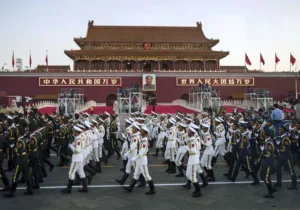Salman Rushdie’s near assassination by stabbing at Chautauqua, New York illustrates multiple clashes of civilizations.
The blood drenched assault by a presumed Islamist would be shocking in any setting, but especially so at Chautauqua, a lakeside Mainline Protestant nirvana devoted to geniality and toleration.
Of course, Rushdie is the British-American novelist of Indian Muslim ancestry whose 1988 novel Satanic Verses provoked a 1989 fatwa death sentence from Iranian Ayatollah Khomeini. The novel had disrespected Islam, Iran’s chief cleric alleged. Iran’s current chief cleric reiterated the call for Rushdie’s death in 2017. Rushdie is recovering but may lose use of an eye.
Rushdie’s assailant is a 24-year-old U.S. born son of Lebanese parents who, according to his mother, was radicalized by a 2018 visit to his father in Lebanon. In a jail interview he praised Ayatollah Khomeini. The Iranian government disavows responsibility for the attack, but Iranian media have celebrated it.
For years Rushdie lived in London under police protection but since moving to New York City has apparently lived without it, with the evident hope that the Iranian fatwa was largely forgotten. Rushdie was slashed on the stage of the bucolic lakeside retreat patronized by refined Mainline Protestants.
Methodists founded Chautauqua in the 19th as a summer camp featuring worship and intellectual stimulation. It later became ecumenical, and, with Mainline Protestantism, liberalized into a genteel kaleidoscope of mainly progressive perspectives on current events, history, and culture. Mostly older people attend, staying in charming lakeside cottages, and feasting on ice cream in between lectures and concerts in the amphitheater where Rushdie was attacked.
The stabbing of Rushdie on the amphitheater stage as he waited to speak brutally disrupted Chautauqua’s vision of a world of harmony, reason, acceptance, conversation, and plenty. Security at Chautauqua is casual because who would interrupt such paradisical proceedings?
But the world, of course, is not as Chautauqua and its refined Protestants might imagine or wish. American Mainline Protestantism descends from centuries of often messily negotiated progress in which tolerance became the highest virtue, and violence was largely banished. The world would be a much, much better place if it more resembled Chautauqua.
Sadly, the upscale Protestant camp is the exception more than the rule, its denizens often projecting onto the rest of the world their lofty assumptions about human harmony and decency. It’s likely been many decades, perhaps a century, before any preacher or lecturer on the Chautauqua stage strongly excoriated human sin or threatened divine judgement. In their world, people are kind, listen to each other, nod their heads empathetically if not approvingly, and share a picnic lunch with perhaps a bottle of wine.
Notable journalists and historians of course have lectured at Chautauqua about the other world, far away, where there are fatwas, assassinations, dictatorial theocrats, and raging passions that silence dissent. During such lectures doubtless there was attentive listening, frowns of concerns, lots of straining to understand, even to empathize with that other strange world. What could be done to mollify or pacify this other world of religious violence and anger? Had “we” by our own sins of commission or omission somehow provoked this distant fury? Could we not dialogue and come to some understanding? Such wrath in the cause of God was, after all, unnatural. Surely it could be soothed.
Nobody at Chautauqua ever considered killing much less stabbing over religious differences. This ecumenical paradise by definition transcended religious differences. Different denominations have their own houses, where clergy or theologians of that tradition might teach over lunch. But afterwards everybody streams back to the amphitheater together to enjoy messages that speak to the whole human spirit, at least as Mainline Protestants imagine. For the mild religionists of Chautauqua, kindness supersedes dogma.
Rushdie as cosmopolitan novelist embodied the Chautauqua ideal. As a secularist living in the West, he pleads for high-minded liberality. He was threatened over thirty years ago, but he had evaded harm, and seemingly he was now safe to live out his message. He was proof that the Western ideal of setting aside religious and political differences in favor of pluralism had largely prevailed.
The blood splattered stage destroyed that illusion. The Mainline Protestant project that is America has uniquely created a wide space for hundreds of millions to live in relative peace, prosperity, and concord. Religions can be believed and extolled, but they are not imposed or causes of open violence. This wide space of liberty and toleration is sustained not by good will by alone but ultimately protected by strategic sagacity, political determination, civilizational confidence, and armed might with the will to use it. Among the kindly gray heads at Chautauqua, there are no doubt more than a few who have served in wars or supported those who did, and who know the world is not Chautauqua writ large.
Poor Rushdie, as a near martyr to free speech, possibly has lost an eye. But perhaps the brutal attempt on his life, before the rarefied audience at Chautauqua, has opened many eyes. His attacker, and the tyrants who inspired him, are an ongoing reality. Their hate and rage will always threaten. We must never become like them. But we must always be prepared to counter and defeat them. Paradises, Protestant or not, do not survive unless robustly defended.






